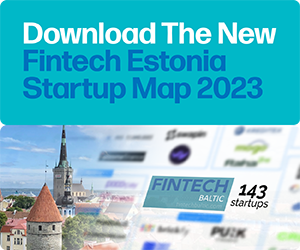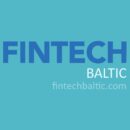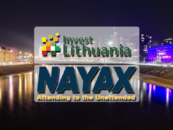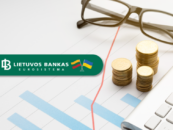2021 was a successful year for Lithuania’s fintech industry with record funding volumes, an expanding startup ecosystem, and strong revenue growth for companies in the sector. The momentum is set to continue this year on ward, a new report says.
This year’s Fintech Landscape in Lithuania, an annual report produced by the country’s investment promotion agency, Invest Lithuania, looks at the state of the country’s fintech ecosystem, sharing key growth metrics and emerging trends.

Funds raised by local fintechs, Source: The Fintech Landscape in Lithuania 2021-2022 Report, Invest Lithuania
According to the 2021-2022 study, fintech companies in Lithuania raised a record of EUR 65 million last year, representing more than four times what was raised in 2020 (EUR 15.6 million). Funding activity was driven by larger rounds, the report says, naming for example TransferGo’s EUR 43 million Series C, Kevin’s EUR 8.5 million seed round, and Ondato’s EUR 3.6 million seed extension round.
Rising funding activity in Lithuania came on the back of strong revenue growth observed by companies in the space. During the first three quarters of 2021, licensed fintechs, namely electronic money institutions (EMIs) and payment institutions (PIs), generated nearly 80% (EUR 313 million) of total market revenue in 2020 (EUR 399 million), and by the end of the year, it’s estimated that they generated a total of EUR 500 million in revenue, representing a 25% increase from 2020.

Revenue generated by fintech companies in Lithuania, Source: The Fintech Landscape in Lithuania 2021-2022 Report, Invest Lithuania
Further reflective of this growth is the expanding workforce the sector employs. By the end of 2021, the Lithuanian fintech industry employed a new record of 5,900 people, representing a whopping 48% increase compared to 2020. The report attributes the increase in the number of employees hired to fintech companies scaling their teams to keep up with the growing demand for their products and services.

Employees in the fintech sector, Source: The Fintech Landscape in Lithuania 2021-2022 Report, Invest Lithuania
2022 is projected to be another year of growth with 12% of the survey respondents indicating expecting to ramp up their operations by nearly doubling their headcount and hiring between 30 to 100 new employees.

Fintech hiring plans for 2022, Source: The Fintech Landscape in Lithuania 2021-2022 Report, Invest Lithuania
96% of respondents expect their revenue to grow in 2022 with 19% anticipating revenue surges of over 300%.

Revenue growth expectations for 2022, Source: The Fintech Landscape in Lithuania 2021-2022 Report, Invest Lithuania
Lithuania’s fintech sector in 2021
In 2021, Lithuania welcomed 35 new market participants, bringing the total number of fintech companies in the country to 265, according to the report. New entrants included financial brokerage and wealthtech companies, crypto and blockchain providers, as well as technology firms.
Looking at the 2022 Fintech in Lithuania map by Rockit, a fintech hub in Vilnius, it is apparent that payments remains the primary segment, making up 31% of all fintech companies in Lithuania.
That being said, the market is getting more diverse, with now 18% of companies working in financial software, 11% in lending, 10% in savings and investments, and 10% in digital banking. Other segments represented include big data and analytics, compliance management and cybersecurity, and insurtech.

Fintech in Lithuania 2022, Source: Rockit
Lithuania’s fintech ecosystem is made of a diverse community of Lithuanian and foreign entities. As of late 2021, more than 60% of fintech companies in the country had their headquarters (HQs) located in Lithuania, the Fintech Landscape in Lithuania 2021-2022 Report shows, while the remaining 40% were mainly foreign companies with their HQs in other locations.
Findings from the industry survey show that foreign companies continue to view Lithuania as their gateway to Europe, with many choosing the Baltic country to host their regional center for operations. More than half of the fintech companies surveyed indicated focusing on strengthening their positioning across the European Economic Area (EEA) and the UK from their Lithuanian base.
With 147 fintech licenses issued, the report claims Lithuania is now the biggest and most vibrant fintech hub in the European Union (EU), hosting the largest number of licensed fintech services providers across the region.

Growth of Lithuania’s fintech sector, Source: The Fintech Landscape in Lithuania 2021-2022 Report, Invest Lithuania
On the heels of the release of the Fintech Landscape in Lithuania 2021-2022 Report, fintech hub Rockit announced earlier this week the winners of the Lithuanian Fintech Award 2022, celebrating the sector’s leaders across several categories.
The Fintech Company of the Year title went to crowdfunding platform Heavy Finance, which was recognized for its contribution to the lending and investment markets. SME Bank, the country’s first digital bank for businesses, won the Fintech Growth Story of the Year award, recognized for its excellence and creativity.
Paytech startup Kevin. was named Fintech Startup of the Year, blockchain technology research lab SUPER HOW? took the Fintech Innovator of the Year title, electronic payments company Paysera received the most votes from the public, and compliance technology company Ondato was named the Fintech Enabler of the Year.
Finally, the Fintech Leader of the Year award went to Agnė Selemonaitė, Chair of the Board of ConnectPay, who was recognized for playing a key role in the Lithuanian fintech community as well as for her contribution to the development of the sector.








No Comments so far
Jump into a conversationNo Comments Yet!
You can be the one to start a conversation.